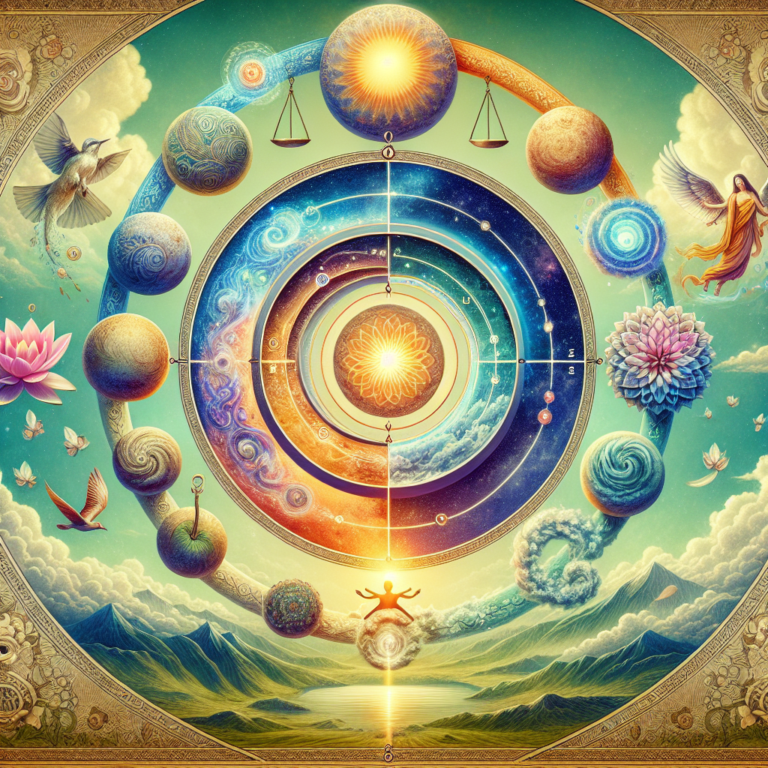The Evolution of Karma: How Different Religions Interpret the Law of Cause and Effect
Karma is a concept that has intrigued humanity for millennia, originating from ancient spiritual traditions. As a principle that underlies morality and ethical behavior, karma is often simplified as "what goes around, comes around." However, the understanding and implications of karma vary significantly across different religions and cultures. This article explores the evolution of karma, its interpretations in various religious contexts, and how this concept continues to influence modern thought.
Origins of Karma
The term "karma" finds its roots in the Sanskrit word "karman," which means "action" or "deed." It is a fundamental concept that emerged in Indian religions around the time of the Upanishadic texts (circa 800-400 BCE). Initially tied to cycles of rebirth, karma served as a way to explain the varying conditions of life and the experiences one endures. In these early philosophical contexts, karma embodied both a natural law of cause and effect and a moral framework guiding human behavior.
Hinduism: Cosmic Justice and Ethical Behavior
In Hinduism, karma is intricately linked to the cycle of samsara, or the endless cycle of birth, death, and rebirth. The law of karma suggests that an individual’s actions—bisected into good (sattvic), bad (rajas), and neutral (tamas)—will determine their future fortunes in subsequent lives. Adherents believe that positive actions cultivate positive karma, bestowing better circumstances upon rebirth, while negative actions generate adverse consequences.
For Hindus, the role of dharma, or righteous duty, is critical; it outlines the ethical framework within which karma operates. Fulfilling one’s dharma is essential, as it fosters good karma and supports the cosmic order (rita). As such, action is deeply intertwined with intention; the moral quality of one’s actions affects the karmic outcome.
Buddhism: A Path to Enlightenment
Buddhism, which arose from Hinduism, offers a nuanced interpretation of karma. Siddhartha Gautama, or the Buddha, emphasized that karma encompasses not only actions but also thoughts and intentions. In the Buddhist context, karma directly influences one’s journey toward enlightenment, manifesting in both present and future experiences.
The Buddhist understanding includes the Four Noble Truths, outlining suffering and the path to its cessation. Karma plays a pivotal role here, as accumulating good deeds can help transcend suffering (dukkha) and escape the cycles of samsara.
Importantly, Buddhism emphasizes the transient nature of phenomena (anicca). Actions driven by ignorance or craving can result in negative karma, whereas actions imbued with compassion and wisdom cultivate positive karma. Thus, the karmic law is not merely punitive; it serves as a guide towards achieving enlightenment.
Jainism: Karma as an Intrusive Substance
Karma is also central to Jain philosophy, albeit in a different light. Jains believe that karma is a form of matter that attaches to the soul (jiva) as a consequence of actions, both good and bad. The goal of Jainism is to liberate the soul by purging it of karma, allowing it to soar into the eternal state of liberation (moksha).
In Jain thought, actions lead to the creation of positive or negative karma, which ultimately dictates one’s fortunes in current and future lives. Therefore, ethical living, non-violence (ahimsa), and ascetic practices are paramount, as they liberate the soul from the cycle of rebirth and the entanglements of karma.
Sikhism: A Unified Understanding of Karma
Sikhism emerged in the 15th century in the Indian subcontinent, integrating elements of Hinduism and Islam. In Sikh philosophy, karma is understood as a law of action where every action leads to a reaction. However, Sikhs believe in the grace of God (Waheguru), which can transcend karmic consequences.
While karma is acknowledged, it does not rigidly define one’s fate. Through devotion, selfless service, and leading a truthful life, adherents aim to align themselves with divine will, thus mitigating negative karma. The teachings of the Gurus stress the importance of moral actions, kindness, and compassion, suggesting that the divine is greater than the deterministic consequences of karma.
Modern Interpretations of Karma
In contemporary society, the concept of karma has evolved further, transcending its religious origins. It has gained popularity in the realms of psychology, self-help, and modern spirituality. Often, it’s framed in a way that promotes positive thinking: the idea that good intentions and positive actions yield beneficial outcomes can encourage constructive behavior.
New-age practices frequently incorporate the karma principle without strict adherence to its religious origins. This reflects a broader trend in modern spirituality—seeking personal growth and accountability without an explicit religious framework. Many people now interpret karma as a motivational principle within the context of personal relationships and societal interactions.
Conclusion
Karma is a complex and multifaceted concept that has undergone remarkable evolution through various religious traditions. From its origins in Hinduism to interpretations in Buddhism, Jainism, Sikhism, and beyond, the principle of karma has shaped ethical considerations and the understanding of human experience. As humanity progresses, the understanding of karma continues to inspire personal ethics and moral responsibility, illustrating the enduring relevance of this age-old principle.
FAQs
Q1: What is the basic definition of karma?
A1: Karma is a principle of cause and effect where an individual’s actions, whether good or bad, influence their future experiences and circumstances.
Q2: Does karma always operate immediately?
A2: No, karma does not operate instantly; the effects of one’s actions can manifest over a prolonged period, possibly in future lives.
Q3: How is karma viewed in Buddhism?
A3: In Buddhism, karma includes actions, thoughts, and intentions. It’s a crucial factor in the cycle of rebirth and suffering, impacting one’s path to enlightenment.
Q4: Can karma be changed or mitigated?
A4: Many religious traditions believe that engaging in good deeds, ethical living, and seeking divine grace can mitigate negative karma and lead to positive outcomes.
Q5: Is the concept of karma only relevant to eastern religions?
A5: While karma has its roots in eastern religions, similar principles concerning moral actions and their consequences exist in many cultures and spiritual practices around the world.
It looks like you might be looking for a writing prompt or idea. Here are a few different types of prompts depending on what you’re interested in:
Creative Writing Prompts:
- Fantasy: In a world where dreams can be harvested and sold, a young dreamer discovers a nightmare that has the power to change reality.
- Mystery: A detective receives a letter from a victim before the murder occurs. The letter contains 12 clues, but only one leads to the killer.
- Science Fiction: Humans have just begun colonizing Mars, but strange phenomena start occurring, causing a team of astronauts to question if they’re truly alone.
Personal Reflection Prompts:
- Write about a time you took a risk and the outcome that followed.
- What is a belief you held strongly in your youth that you now see differently?
- Describe a place that makes you feel at peace and what memories it holds for you.
Poetry Prompts:
- Write a poem from the perspective of an inanimate object in your room.
- Explore the theme of change using a season as your central metaphor.
- Create a haiku about the first snowfall of the year.
Dialogue Prompts:
- Write a conversation between two people who meet at a train station after several years apart.
- Imagine a parent and child discussing a significant life decision. What advice do they give each other?
- Two friends catch up over coffee, but one has big news that changes everything.
Feel free to choose one or modify it to suit your needs! Let me know if you’d like more ideas or specific topics.
, #Evolution #Karma #Religions #Interpret #Law #Effect, #Evolution #Karma #Religions #Interpret #Law #Effect, 1736447957, the-evolution-of-karma-how-different-religions-interpret-the-law-of-cause-and-effect




